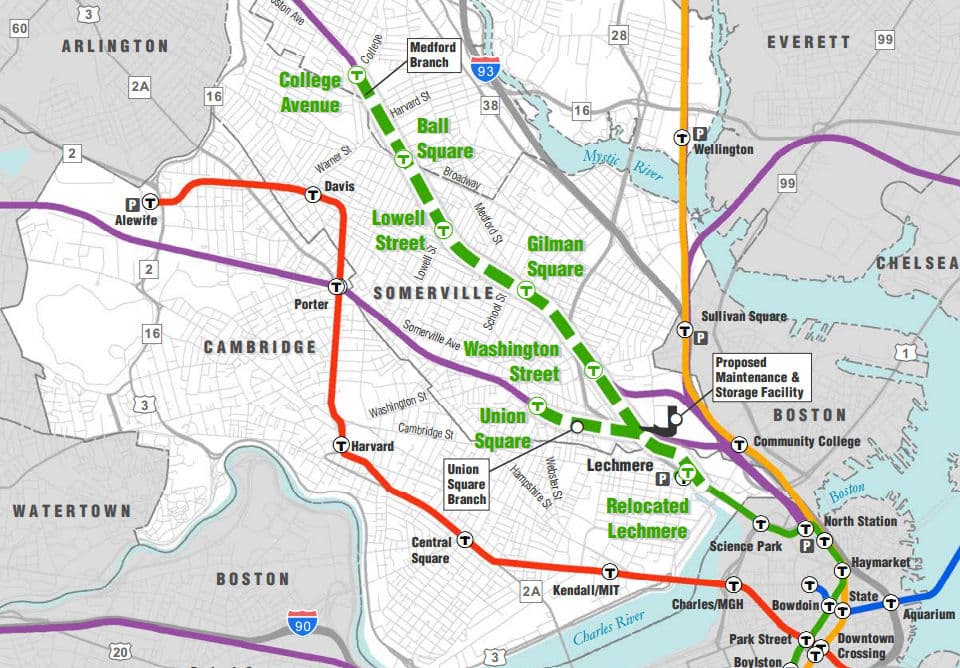Ballooning Cost Throws Future Of Green Line Extension Into Question (original) (raw)
The cost set by the Green Line Extension contractor for the first three stations is more than double the amount state and federal transit officials recently estimated, calling into question the full price tag of the new trolley line and whether the state can afford to build it.
Recently estimated at about 2billion—whichdoesn′tincludethecostoffinancing—thefullcostofaddingsevennewtrolleystationsinEastCambridge,SomervilleandMedfordcouldwindupasmuchas2 billion — which doesn't include the cost of financing — the full cost of adding seven new trolley stations in East Cambridge, Somerville and Medford could wind up as much as 2billion—whichdoesn′tincludethecostoffinancing—thefullcostofaddingsevennewtrolleystationsinEastCambridge,SomervilleandMedfordcouldwindupasmuchas1 billion over budget, MBTA Interim General Manager Frank DePaola told reporters on Monday. Officials who briefed the MBTA's Fiscal and Management Control Board on Monday afternoon are now looking to renegotiate with the contractor and alter the plans.
An early phase of building a new Lechmere Station, a spur to Union Square, and Washington Street Station in Somerville was estimated to cost 387millionthispastwinterwhentheFederalTransitAuthority[approvedalmost387 million this past winter when the Federal Transit Authority [approved almost 387millionthispastwinterwhentheFederalTransitAuthorityapprovedalmost1 billion in federal funding.
White Skanska Kiewit, which has been assigned construction of the project under a unique procurement process, now estimates construction of those first three stations to cost $898 million, throwing into question the affordability of the plan to build a total of seven stations ending near Tufts University.
“Everything’s on the table, and everything includes cancelling the project, but that’s not where we want to go, but we need a project we can afford to build."
Transportation Secretary Stephanie Pollack
"Everything's on the table, and everything includes cancelling the project, but that's not where we want to go, but we need a project we can afford to build," Transportation Secretary Stephanie Pollack told reporters Monday.
Transportation officials are now looking at whether more modest stations — similar to elsewhere on the Green Line, in Newton — could shave costs, as might a scale down or elimination of a multi-use path that is part of the plan. Additionally state transportation officials are looking at the possibility of using other revenue sources, including federal highway funding and potentially value-capture funding from entities that would benefit from the new transit line.
A map of the proposed Green Line extension project. (Mass.gov)
White Skanska Kiewit has the freedom to set the price because the state used construction-manager-general-contractor, a type of procurement that DePaola said the federal government has endorsed for large projects. While additional engineering has revealed geological conditions and polluted soil that upped the $387 million price, DePaola said the dramatically higher cost may be caused by the contractor pricing in risk and the hot Boston construction market.
"I've actually known this since May 21," DePaola said. "We were stunned obviously."
The Conservation Law Foundation, the advocacy group where Pollack worked years ago that sued the state to move the project forward, supported transportation officials' plan to deliberate and gather feedback before deciding on what to do next.
"CLF is disappointed to hear about the increased cost estimate. We understand and appreciate that the MBTA and MassDOT are not planning to make any quick decisions in wake of this bad news," read a statement provided by CLF senior attorney Rafael Mares. "It is important at this time to engage the public and all stakeholders in a deliberate process on how to tackle these financial challenges. The full Green Line Extension is not only a critical regional transportation project, but also a legal requirement under the federal Clean Air Act and as such we need to find good solutions to ensure completion of this project. CLF stands ready to help."
The procurement method allows the state to cap risk, and a third route might involve the state going out to bid separately on particular aspects of the project, such as the Union Square Station. Alternatively, the state could restart the procurement — eliminating the possibility of White Skanska Kiewit from participating.
The state's power in renegotiating with the contractor derives from the possibility that the state could either walk away from the court-mandated project or remove White Skanska Kiewit by going back out to bid.
Pollack said dealing with the ballooning cost could require legislation and involvement by the Massachusetts Department of Transportation Board of Directors as well as the control board.
The state has already invested significant "sunk costs" into the project, Pollack said.
